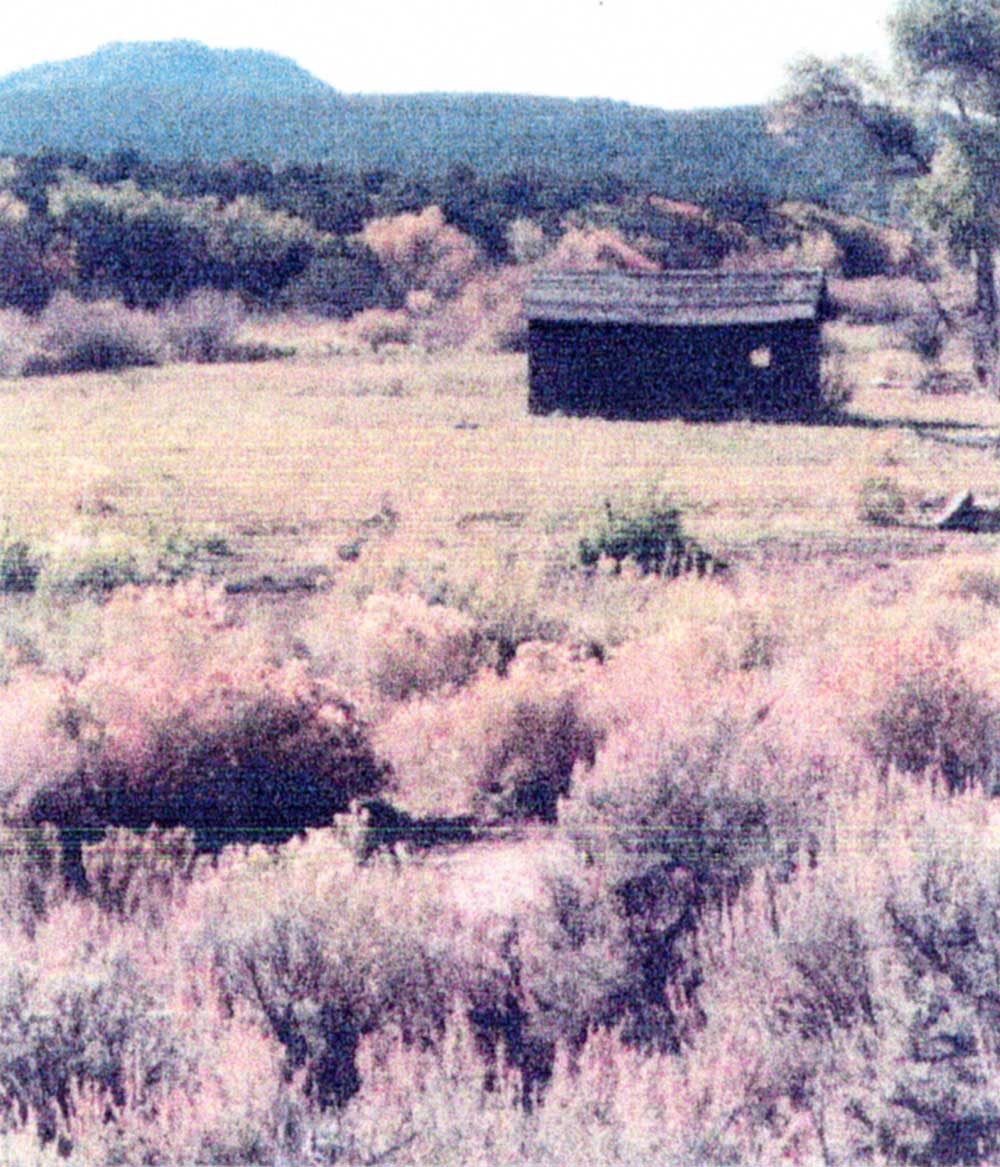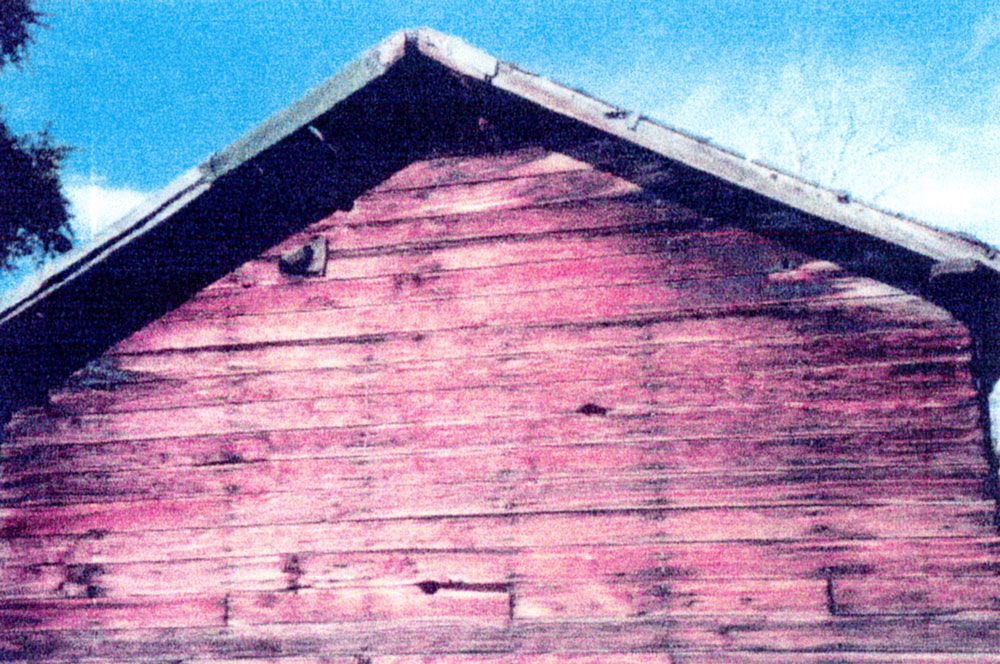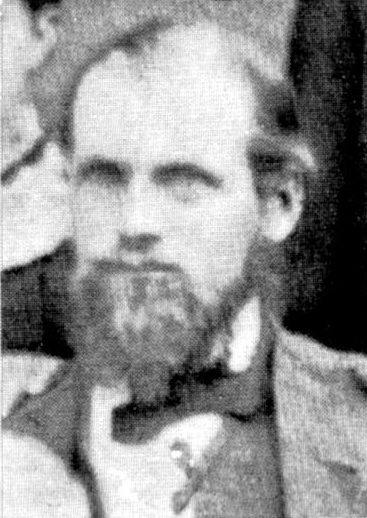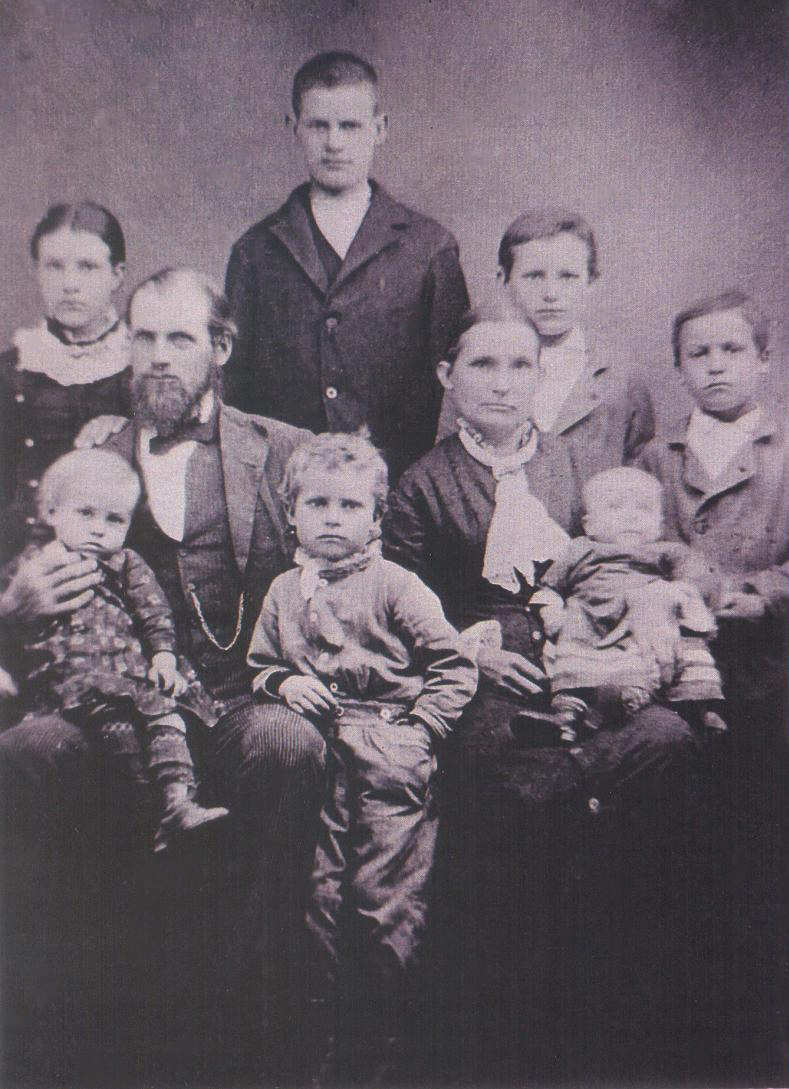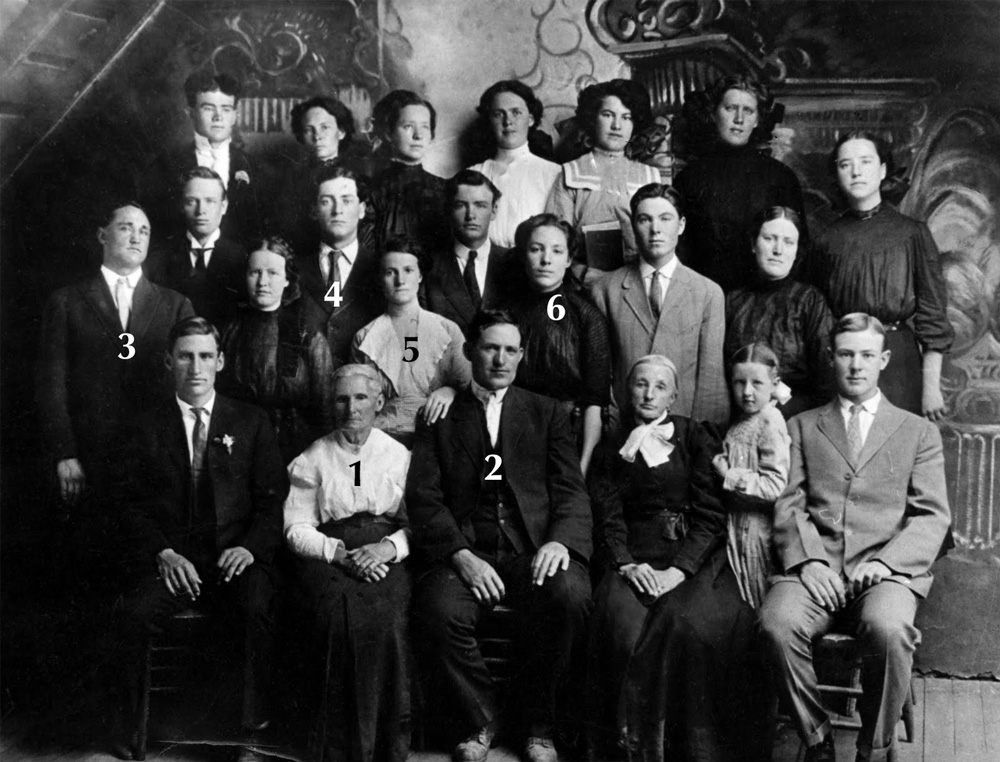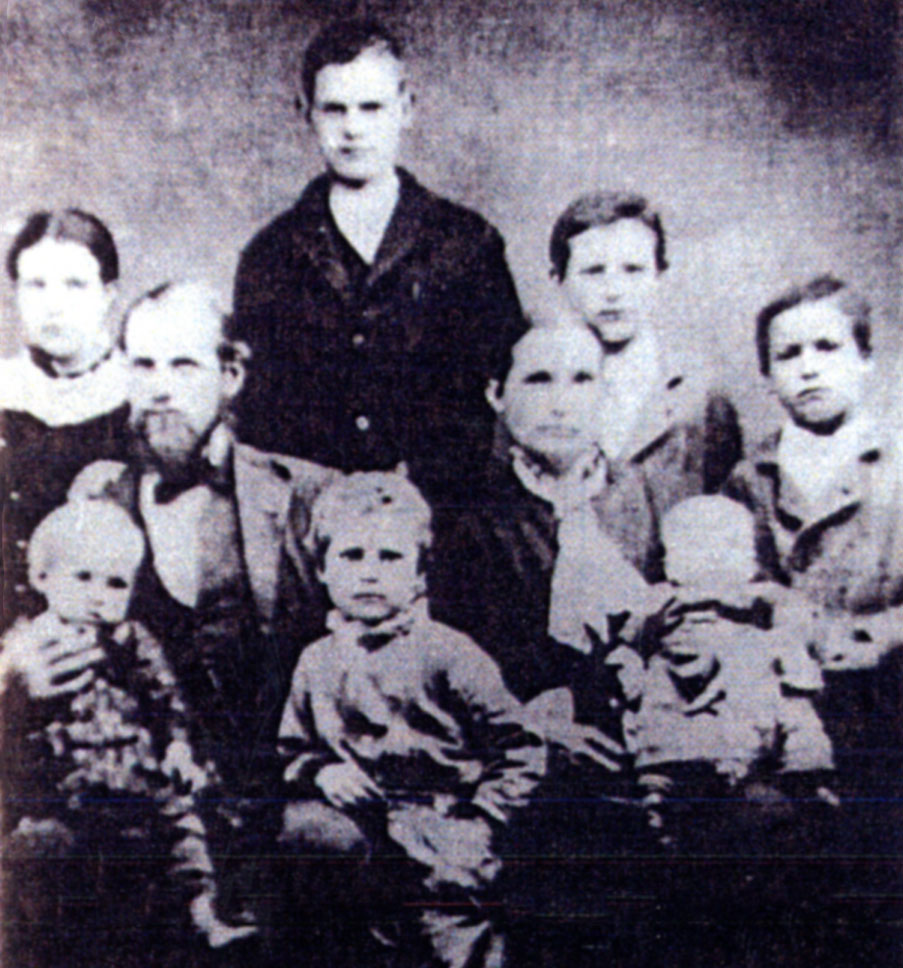Joseph and Lee’s Ranch Indian Raid
Serious Wound Ends Joseph’s Life Prematurely
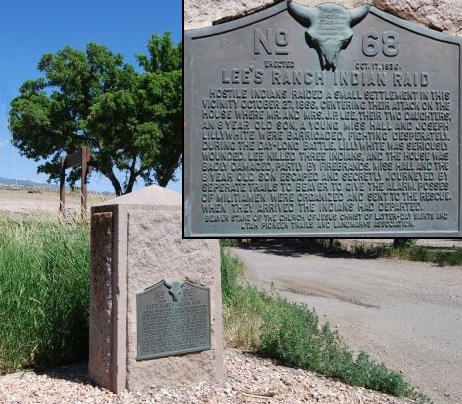
Monument Inscription
Hostile Indians raided a small settlement in this vicinity October 27, 1866, centering their attack on the house where Mr. and Mrs. J. P. Lee, their two daughters, and 8 year old son, a young Miss Hall and Joseph Lillywhite were barricaded, fighting desperately. During the day long battle, Lillywhite was seriously wounded. Lee killed three Indians, and the house was badly damaged, partly by firebrands. Miss Hall and the 8-year-old son escaped and secretly journeyed by separate trails to Beaver to give the alarm. Posses of Militiamen were organized and sent to the rescue. When they arrived the Indians had departed.Lee’s cabin as it appears today with the old cabin still standing.
Lee’s cabin with the burn marks still visible.
Joseph Lillywhite
Joseph Lillywhite and Mary Ellen Willden with their children.
Additional resources:
You can read Orson Ferguson Whitney’s version of the account in a Google Ebook.
PIONEER STORIES
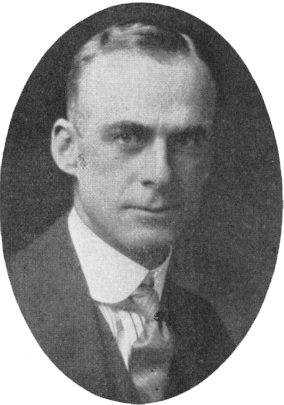
Preston Nibley ca. 1920
A book compiled by Preston Nibley under the direction of the Presiding Bishopric of the Church of Jesus Christ of Latter-day Saints, containing stories for the youth of the Church. The story on this page was gleaned from “Indian Depredations in Utah” by Peter Gottfredson. All the facts of the story have been substantiated.
In the fall of 1866, Mr. John Percival Lee, with most of his family, was on his dairy farm called “Hawthorne Dell”, situated about eight miles southeast of Beaver on a bright little stream called “South Creek”, busily pushing preparations to return to town for the winter.
He usually spent the winters in town, employed in teaching school, and the summers at “Hawthorne Dell”, farming and dairying. Already he had turned out some thirty milch cows with their calves along with the dry stock, to forage on the good bunch until spring. The grain was standing in stacks ready for the thresher, and Mr. Lee and his young hired man, Joseph Lillywhite, were gathering potatoes with the help of several children who assisted to pick up the tubers. The plan was to fill the double-bedded wagon full and early the next morning take that load to town and there make ready for storing the whole crop. This was the 22 of October, and Mr. Lee intended to take his helper with him, and rather thought they could not return on the same day, having so much to do there.
Threat of Danger
It was sunset before the load was completed, and all the busy workers noticed that the wolves were very noisy, and seemed to answer each other from many directions. They took no hint however, even when a neighbor from town, Mr. Elliott Willden, who had been out on the range, and who tarried to take supper with the Lees, remarked that Indians often used wolf howls to signal to each other and to drive cattle together.
After the guest went on his way, Mr. Lee said to his helper; “Joe, it does seem foolhardy to live on a lonely place like this and pay so little attention to our firearms. Say, we clean them all up tonight and get our ammunition all ready. Then, if we do stay in town tonight, Mrs. Lee will not be quite defenseless you know.” Lightly spoken words and long remembered!
The firearms consisted of one large double-barreled shotgun (Mr. Lee’s favorite weapon), one new excellent repeating rifle, and one good six-shot revolver. The stock of ammunition was found to be pitiably smaller and Mr. Lee resolved to buy some on the morrow while in town. The magazine of the rifle contained the whole of its stock of cartridges. The shotgun and revolver were both loaded up with revolver balls, with plenty of powder behind them. Mrs. Lee assisted in the loading to be sure of understanding all about it. With this preparation the family retired to rest in blissful unconsciousness of the danger that was even then hanging over them. All night, however, the wolf howls continued and two dogs barked and fretted.
Before light next morning, the family was a stir and as soon as the back (west) door was opened the dogs barked so furiously toward a low ridge only a few rods away on the north that the two men took their guns when they stepped out to reconnoiter. There was still no daylight, but the skyline showed faintly the ragged crest of the brush crowned bench. “Mr. Lee,” said Lillywhite, “I see something move. Shall I fire?” “Hail first, Joe,” answered Mr. Lee, “for if it should be Indians, and we fire first, it will be said, ‘that we brought trouble on ourselves.’”
Joseph Wounded
Accordingly, the young man hailed, and for the reply received a volley of bullets, one of which went through his right shoulder. He reeled and the gun fell from his helpless hand, but he staggered into the house before he fell. Mr. Lee, with other bullets singing past him, watched the young man till he gained cover, then fired one barrel of his shotgun at the place where he saw the flashes, and sprang into the house, forgetting to recover the rifle.
The doors and windows had not yet all been opened. Such as were open were now hastily closed, just barely in time to prevent the entrance of the Indians as they rushed yelling down the hill.
The front or east door had only a wooden button on a screw for a fastening, and the west one had a broken gimlet stuck nail fashioned into a small hole, so that it was necessary to reinforce these frail fastenings with furniture.
Indians Attack
For the first few minutes the whoops and yells of the Indians, punctuated as they were with heavy blows on the doors and with shots through both windows, which fortunately had strong wooden shutters, secured with iron hooks on the inside. When these were all closed, the house would have been very dim had the sun been shining; but now, just at the break of day it was quite dark and a tallow candle had to be lighted to enable Mr. Lee to reload the empty barrel of his shotgun.
After raising such a hideous storm around the house for what seemed an age, the Indians grew quiet and one advanced to parley. During this lull in the strife, it my be well to introduce to the readers the remaining members of the household.
Besides Mr. and Mrs. Lee and Mr. Lillywhite, there was a young daughter not quite sixteen years old, who lived to become Mrs. Mary C. Black, now (A.D. 1914) a skillful apiarist (beekeeper) resident in Fruita, California. Another daughter, twelve years old, who afterward became the wife of Judge J.G. Sutherland, an eminent jurist in Salt Lake City. Before her marriage, this lady had studied law, passed a successful examination and been admitted to practice before the bar. She was then Miss Emma Lee.
Next was a son, Charles A. Lee, an enterprising lad of nearly ten years, who is now an apiarist and orchardist in Fresno County, California.
Next was a little daughter between seven and eight years old, now Mrs. Ellen L. Sanders, living in Nacozari, Sonora, Mexico.
Last was baby Rosamond, only fifteen months old. Besides these five children of their own, there was a little English girl named Jane Hall, whose father had left her temporarily with the Lee’s while he went in search of a home and employment. She was about thirteen years old.
These six children would have made a costly sacrifice to be offered up on the altar of red handed violence.
Mrs. Lee Stands Her Ground
The Indian spokesman who hailed Mr. Lee by name, said that he was Too-witch-ee Tick-a-boo, a very good friend who was hungry. Would his friend John open the door and give him bread, milk, matches, etc. Mr Lee, after some talk, said to his wife, “We have always been such good friends with the Indians, can it be possible that all this is a mistake?” “Not possible,” she replied, “that all this shooting is any mistake.” The Indian continued to plead and protest until Mr. Lee said again to his wife, “I have so little ammunition that I cannot fight long; and when it is all gone, we should be at their mercy, and they would be still more angry than they are now.”
What do you think? “I think just this: They are not hungry at all, and have no occasion to be so.
“They have simply made up their minds to kill us. We will fight as long as there is one shot left, and trust to God. Let me answer once.” “No,” she called to the Indian, “you are not Tick-a-boo! We will not open the door! If you come in here, we will shoot you!”
The Indian laughed, and said, “Oh! Squaw shoot!” Now me scared! Yes, now me scared!”
Mr. Lee hastened to speak again lest the enemy suppose that the woman had spoken because he was disabled.
Attempt to Burn the Cabin
Now the defenders learned the real reason for the stay of proceedings and the parley; for little puffs and lines of smoke began to come in between the roof and the walls of the unsealed rooms. The Indians had brought sagebrush and pushed bundles of it with poles up under the eaves, and fired them.
Providentially, there had been snow sometime lately, and although the most of it was gone from sight, the roof of boards and slabs was so damp it would not blaze. The underside, with the burning brush against it, took fire but only smoldered, and poured into the rooms clouds of bitter smoke. It floated high for awhile, and then settled down like doom upon the defenseless inmates. It grew so dense that strangulation threatened, and baby Rose gasped and struggled so that she seemed about to die. At one time some one discovered that under the best bed was better air, and Mary was appointed to take the child there and tend her. The other children stuck their heads into cupboards and even the Dutch oven, or wherever they could find a little air. There was still a little water in the house, which was hoarded carefully. The wounded man continuously moaned for water, the baby drank eagerly, the others must have a few sips, and there was a very little to spare for the fire, but that was cautiously applied so as not to waste one precious drop.
Emma had used some to make a warm drink for her father who dared not be off his guard for a single minute, and she had also given the children drinks of milk and bits of bread, but the parents had no time for eating.
Tending to Joseph’s Wound
The smoke thickened till the wounded man groaned in distress; and Charles, Emma and Janey Hall took turns in fanning him while they breathed through damp handkerchiefs, and coughed in a way that must have been music to the ears of the would-be murderers. Charles would even lift the head of the fallen youth to give him water, and did so until he was nearly as bloody as the patient. As the dim increased, and more shots flew through the stifling smoke, Charles and Janey went together to the mother to ask what they could do to help.
Turning to God
“You poor children,” she answered, “there is nothing you can do with your hands; but you might pray with all your might for God in Heaven to help us—He only can”; and those two children knelt down amidst all that blood and smoke and uproar, and prayed with all the unstudied earnestness of trusting childhood; and who shall say they were not heard?
Indians Draw Close
About this time some Indian inserted the tines of a pitchfork into the closing of the east door, and burst off the frail wooden button, but the cupboard barricade did not allow the door to open more than an inch or two. Here the darkness within gave Mr. Lee his first real advantage over his assailants. He saw without pressing near enough to be seen, an Indian raising his gun to fire through the crevice, and he turned loose with the old shotgun at point blank range.
A wild yell, followed by dreadful shrieks, groans and howls, was the result of this, the second shot from the gun, which fairly tore away the right shoulder of the Indian. Almost immediately, Mr. Lee saw another Indian at a few rods distance ramming a load into his gun. He sent the load from the other barrel after his besieger, and handed the gun to his wife to be reloaded, while with his revolver in hand, he continued his watch through that dangerous but convenient opening.
The Indian who received that last shot, had seemed to think he was out of range, for when the charge struck him, he dropped his gun and sprang straight upward with a suppressed, guttural cry that seemed to express as much surprise as pain. By this time the Indians decided that they had no use for that narrow opening in the door, for the pitchfork was cautiously removed, and the besieged hastened to drive in a stout nail.
Children Join the Fight
During this part of the action, Emma had found an ax in the kitchen, and stationed herself by the west door, saying grimly that she would do her best to chop off a leg from the first Indian who came in there. Had the occasion and the moment been less tragic and desperate, this might have been amusing, for she was a delicate girl and small for her age, but she meant it!
Her mother smiled drearily at such training for a dainty girl, but her keenest anxiety in this terrible situation was for her daughter Mary. She found and gave to Mary a small dagger in a sheath attached to a narrow leather belt, and directed her to buckle it around her waist.
The uproar on the outside gradually subsided; and the smoke on the inside thinned a little, probably being drawn up through the two chimneys.
The besieged waited with straining ears to learn what new deviltry was to be practiced on them, while the slow minutes dragged along. The baby, pale and gasping, grew so weak and faint, that the mother in desperation took her to a west window which she opened enough to give the child a few breaths of outside air. The father ran in alarm to see what had happened, and on seeing the condition of the child, took up his guard there as long as they both dared. Then he said, “I will rush out and get water to drink and to throw on the fire.”
His wife protested earnestly against this, so did the children. Mrs. Lee believed that the treacherous foe had only pretended to go away, hoping to entice him, the only fighting man, to go on this very errand, so they might pick him off easily. “If he were killed,” she urged, “the others very soon would be.”
He yielded to their entreaties; and Mrs. Lee, who was never known to flinch in the face of duty, and Mary, who had already concluded that an Indian bullet would be far better than a dagger in her own hand, took buckets, and when the barricade had been removed from the back door, while the husband and father stood at guard for them, they ran to the stream, only a rod or two from the south end of the house, and secured water.
The opening of the door (which was hastily barricaded again) released a volume of smoke, the water relieved their aching throats and smarting eyes, and with it they finally extinguished the fire. There had been no demonstration whatever from the enemy for nearly an hour, and hope that the Indians were really gone, they began to struggle with the fear of an ambush, when Charles came to his parents with a grave proposal that they allow him to run to town and ask for help.
They were horrified at the bare thought of sending out a young child to go eight miles on foot, more probably, to be shot down before their eyes by their lurking foes. But, the boy had the look of one inspired while he urged, “I know I can go and not be shot,” and said he would not follow the wagon road which wound among the ridges, but would take a straight shot across the country, which would shorten the way two miles or more.
The parents then looked into each other’s eyes and agreed without words. “God is with the child,” said the father, and laying his hands on the head of his brave little son, he solemnly blessed him. His mother kissed him just as solemnly, with all the dust and blood upon him. Then they opened the west window looking toward town and the boy sprang through and ran like a deer until lost to sight among the stunted cedars and sagebrush on the hillside.
His father remained by the open window watching for signs of an enemy until the flying figure disappeared. Then he closed the window and with his tired wife and weary children, prepared to face another interval of inaction and suspense. But just here, Janey raised a diversion by requesting Mr. and Mrs. Lee to let her also run away to Beaver. This they assured her they would never do. She was a girl—nearly thirteen years old—not even their own. Oh, no! That was not to be thought of—not for one moment!
But the more they explained these things to Janey, the more persistent she grew, and the more fiercely she accused them of allowing one of their own to escape and save his life, while they kept her to be killed. After fifteen minutes to half an hour of screams and tears, and alternate entreaties and upbraidings from Janey, Mr. and Mrs. Lee decided that only God in Heaven knew whether it was less dangerous to go or to stay, and they let her go.
Mr. Lee stood at the window as before to keep his futile watch over the child until she went out of his sight around the bend in the road.
The sequel proved that at this very time the Indians were really gone to join their companions who were passing the droves of cattle, and happy would the Lee’s have been could they have known it.
When Charles set out, he felt, as he said afterwards, as if he could fly. He fixed his eyes on a landmark and never went around a rock or a bush, but leaped over them. He had no sense of fatigue until he reached the little suburb of Beaver, which had been named Pleasant Point, but nicknamed Jackson County. Here he saw Mr. Anderson, just about to mount a horse to ride over to Beaver about a mile distant.
Seeing the boy all bloody and wild, he paused to make inquiry. The boy panted out, “The Indians—fighting—Hawthorne Dell.”
“Poor boy,” said Mr. Anderson. “Sit down here and rest and I’ll stir up Beaver in a hurry.” He mounted and galloped away, and the boy sat down on some timbers and felt like he never could move again. He had lost his hat and shoes, scratched his flesh and torn his clothing to rags, but he had accomplished his errand in a marvelously short time.
Reinforcements from Beaver
The boy was still sitting in the same place when a band of mounted men whom Mr. Anderson had “scared up” passed on their way to Hawthorne Dell. They shouted “Hello Bub,” but never drew rein. Near Birch Creek, about half the distance to the ranch, they met Janey Hall, who to their surprise, did not seem frightened nor excited, but was walking leisurely along the road, and chewing gum that she had picked up on the way. They greeted her and passed on, and she finished her long walk alone, but safely.
When the horsemen reached the ranch, sometime before noon, they found no Indians, but scouted about and found plenty of signs. Patches of frothy blood on the top of the ridge whence came the shot that brought down young Lillywhite before he had a chance to fire once. Other blood on the ground east of the house, and indoors too. The dropped rifle was found and utterly ruined, and with its magazine quite empty. Harness, saddles, tools and many other things were destroyed. All the horse and cattle enclosures were left empty and untold damage done. But of the nine persons besieged, only one had been hurt, and the grain stacks were safely standing. For these mercies Mr. Lee was a thankful man.
A few of the men remained to assist the family while the others pushed on after the Indians.
It did not take these on the trail very long to understand the situation. The range was silent and empty, and the fat young cattle found shot along the trail told them the whole story. They knew that the relations between this family and their Indian neighbors had always been friendly, therefore, it was highly improbable that this attack had any personal ill will behind it, but was made solely because the little ranch lay in the track the Indians wanted to use in a great cattle raid. Although they must have known that the family was hurrying to get away for the winter, they could not postpone the raid, because they also knew that the white men were preparing for an extensive roundup, and they, the Indians, wished to raid beforehand.
These men followed the Indians and cattle sixty or more miles without overtaking them, swift as they had been to follow. Then they were forced to turn back because their fast preparations were so inadequate for a long march or for a hard fight.
Mr. Colton Saves Joseph
At the farm the great concern was to get the wounded man and the family away before night. The team was gone, the harness demolished, the wagon heaped up with potatoes; and the only vehicle that had come from town was a very light buggy belonging to Bishop J. R. Murdock. This could not even convey the wounded man, who was too weak from loss of blood to sit erect. Just here the memory of Mrs. Lee (84 years old) under whose sanction and promptings this chronicle is made, fails her; and the woman, who was not an eyewitness, supplies from impressions received at the time this one statement, believed, but not guaranteed, to be true.
A good brother named Alonzo Colton, from Minersville, was on his way to a sawmill farther up in the mountains to get a load of lumber. He arrived at Hawthorne Dell when it began to look as if there was nothing to do but to send to Beaver for conveyance and await its coming, a most dreaded alternative. On hearing of the dilemma, Mr. Colton promptly unhitched his team, and leaving his “running gear” standing, hitched on to Mr. Lee’s wagon, from which the potatoes were hastily “dumped.” The sick man in his bed and the wife and children were then loaded in, and Mr. Colton himself drove them down the mountain road to their home, where they arrived at about five o’clock p.m.
Now, if this statement is not right, Mr. Colton or any surviving member of his family is at liberty to correct it; and she who makes this declaration stands ready to apologize amply. One thing, however, that she knows to be a fact, is that when some days later, threshing was done, this same Mr. Colton with his own wagon and team brought down one or more loads of the crop, and never would accept one cent of pay. For his kindness to fellow creatures in distress, he is gratefully remembered to this day; also others who freely rendered assistance at a time of need.
Divine Intervention
This murderous and unprovoked attack took place on the 23rd of October, 1866. Mr. Lee, who is not now living, always considered it a divine intervention that prompted him to put his firearms into good condition just on the eve of such dire need. He fired only three shots (having no ammunition to waste), but every one reached its mark. The Indians at the time made themselves scarce, and knew absolutely nothing. But in after years they said Mr. Lee was a Big Chief, and a Brave, and that he had killed three bad Indians who had tried to kill him. These were the Piutes, whose home was in Beaver County, and who knew every member of Mr. Lee’s family well, and often visited them at the farm.
It is even probable that the very matches used to fire the dwelling had been begged from the intended victims. One queer thing not yet mentioned is that when the east door of the house was finally opened, it was found piled high with sagebrush that had not been fired. And after much wonder why this dry door was left unburned, while the wet roof had so much effort spent on it in vain, the conclusion was finally reached that after the brush was heaped against the door, the Indians found they had used all their matches. If so, it was certainly an error of judgment on their part, because the door would have burned readily.
Joseph Lillywhite recovered from his wounds, but it is said that he never became the strong man that his robust youth promised, and did not live to reach middle age.
Such were the experiences of the early settlers of Utah.
